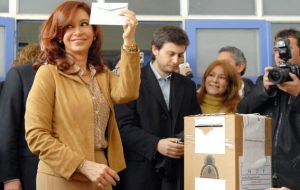MercoPress. South Atlantic News Agency
Argentine economic activity expands strongly in September but at slower pace
 All numbers seemed tuned to the 2011 re-election project
All numbers seemed tuned to the 2011 re-election project Argentina's economy activity expanded strongly in September but at a slower pace than in previous months, according to a Friday release from the country’s Statistics Office, Indec.
The EMAE economic activity index rose 7.8% in September versus the same month last year, but the slowest year-on-year pace since March. The EMAE rose 8.5% in August year-on-year and has been increasing by over 8% since March.
According to Indec, economic activity expanded by 0.2% in September over August and accumulates 9% in the first nine months of 2010.
Indec also reported that Argentina's industrial production fell 0.4% in October compared with September, the government's seasonally adjusted data showed. Industry output rose 8.4% in October from the same month last year, below forecasts of 8.6%. However in the ten months of 2010 it accumulates a 9.3% increase.
”It looks like there is no more room for growth. The bottleneck is due to energy (limits),” and because the industry is already using all its installed capacity, said Milagros Gismondi, an analyst with Buenos Aires-based consulting firm Orlando Ferreres and Associates.
Latin America's third largest economy is expanding at one of the fastest rates in the region, fuelled by strong demand for Argentine-made cars and manufactured goods from neighbouring Brazil and a record soybean and corn harvest last season.
The government has forecast annual expansion at 9% this year.
However, robust economic growth is stoking inflation. Analysts see annual inflation at over 25% this year, well above the forecast by the government, which has been accused of under-reporting price increases for political gain and to save money on repayments of inflation-indexed bonds.
Inflation is being fuelled by generous public spending and the government's controversial use of central bank profits and reserves to pay debt. Analysts expect the government to maintain loose monetary policy ahead of an October 2011 vote in which President Cristina Fernandez is likely to seek re-election.
According to Indec an Argentine standard household required a minimum income of 1,231.51 pesos (310 US dollars) in order to stay just above the poverty line in October. The “total basic food basket” (CBT) was 2.8% more expensive in October against September and 14.3% so far 2010.
The CBT index is made up of a number of foodstuffs and services deemed essential for a family of four to survive a month. On the other hand, the CBA index, which only includes foodstuffs, hit 569.77 pesos (145 US dollars). The CBA moved up by 18.2% a year to October and 3.4% in October from the previous month.




Top Comments
Disclaimer & comment rules-

Read all commentsSo, according to Indec, Argentina's economic activity expanded strongly.
Nov 24th, 2010 - 04:39 pm 0Then, a few days later, there's an article about Argentina wanting IMF assistance in creating a new CPI. Why wouldn't Indec do it? Ahhh, because, as the article goes on to say, Indec is political not accurate. There's a surprise!
Commenting for this story is now closed.
If you have a Facebook account, become a fan and comment on our Facebook Page!